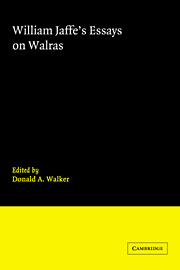Book contents
- Frontmatter
- Contents
- Preface
- Acknowledgments
- Introduction
- PART I WALRAS'S BIOGRAPHY
- PART II THE GENESIS AND DEVELOPMENT OF WALRAS'S IDEAS
- PART III THE SCOPE OF WALRAS'S WORK
- 7 Léon Walras and his conception of economics (1956)
- 8 Léon Walras (1968)
- PART IV SPECIAL TOPICS IN WALRAS'S ECONOMICS
- PART V WALRAS'S PLACE IN THE HISTORY OF ECONOMIC THOUGHT
- Index
8 - Léon Walras (1968)
Published online by Cambridge University Press: 05 May 2010
- Frontmatter
- Contents
- Preface
- Acknowledgments
- Introduction
- PART I WALRAS'S BIOGRAPHY
- PART II THE GENESIS AND DEVELOPMENT OF WALRAS'S IDEAS
- PART III THE SCOPE OF WALRAS'S WORK
- 7 Léon Walras and his conception of economics (1956)
- 8 Léon Walras (1968)
- PART IV SPECIAL TOPICS IN WALRAS'S ECONOMICS
- PART V WALRAS'S PLACE IN THE HISTORY OF ECONOMIC THOUGHT
- Index
Summary
THEORY OF GENERAL EQUILIBRIUM
For many years Walras thought that his chief title to fame lay in his marginal utility theory, which was certainly more rigorous and elegant than that of either Jevons or Menger. He did not realize the full significance of the unique character of his general equilibrium system until Barone hailed it in the Giornale degli economisti (1894, p. 407) as “the most general, most comprehensive and most harmonious” that had yet appeared. Already in the 1870s, in the first edition of the Éléments, Walras had laid the groundwork for a unified model, comprising the theories of exchange, production, capital formation, and money. In the subsequent revisions of the Éléments, he strengthened the model by applying the principle of utility maximization throughout. Moreover, to link his model to the real world, he followed up each of his successive cumulative submodels describing the static determination of equilibrium with a related quasi-dynamic theory of the emergence (or establishment) of equilibrium via the operation of the competitive market mechanism. He called the process of automatic adjustments of the network of real markets to equilibrium one of tâtonnement, that is, of groping without conscious direction. His argument that the process would culminate, under his assumptions, in a stable equilibrium was, nevertheless, intuitive, without any semblance of a rigorous demonstration.
- Type
- Chapter
- Information
- William Jaffe's Essays on Walras , pp. 131 - 136Publisher: Cambridge University PressPrint publication year: 1983



